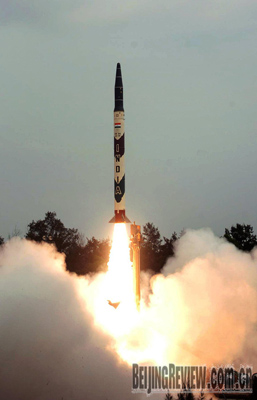|

BLASTING OFF: India successfully tests a medium-range, nuclear-capable Agni-I missile on March 23. Defense analysts say the missile system is a major step in India’s nuclear deterrence program
Divided response
The U.S.-India deal raised international misgivings since India has shunned the NPT, which is meant to stop the spread and production of nuclear weapons and mandates gradual disarmament. Furthermore, India has not committed itself to joining the NPT or a companion agreement, the Comprehensive Test Ban Treaty. While the United States, Russia and France supported lifting the nuclear trade ban, others such as Norway, Ireland, New Zealand, Switzerland, the Netherlands and Austria were hesitant. They insisted that the decision include strong wording to ensure that India would not test nuclear weapons again. Under heavy U.S. pressure, however, they agreed to the use of watered-down language.
Pakistan, India's neighbor and rival, clearly has reason to worry. A Pakistani army statement in August said the U.S.-India nuclear agreement would have negative implications for South Asia's strategic stability, as it would enable India to produce significant quantities of fissile material for nuclear weapons. Regional stability and the global non-proliferation regime would have been better served, the statement said, if the United States had considered a package approach for both India and Pakistan, which conducted its first nuclear weapon tests two weeks after India.
China, which has been trying to improve its relations with India, takes a cautious attitude toward the NSG's decision. While reaffirming its pledge to cooperate with all parties on the peaceful use of nuclear power in accordance with its international obligations and on the basis of equality and mutual benefit, China believes that all countries are entitled to make peaceful use of nuclear energy. Meanwhile, relevant cooperation should be conducive to safeguarding the integrity and efficacy of the international non-proliferation regime.
China hopes the NSG will equally address the aspirations of all parties for the peaceful use of nuclear power while adhering to the non-proliferation program. A Chinese Foreign Ministry official said that China hoped the decision by the NSG would contribute to the peaceful use of nuclear energy and support the goals of nuclear non-proliferation and peaceful use of nuclear power.
A turning point
The NSG has been imposing strict embargoes on countries that are not NPT signatories. The recent decision thus marks a turning point that, in the long run, will have a profound impact on international non-proliferation efforts. It has opened a new chapter in global efforts to limit the nuclear threat.
Supporters of the decision argue that the policy change by the NSG will keep nuclear technology and materials off the black market, ultimately making the world a safer place.
Critics of the decision, on the other hand, fear the NSG decision will jeopardize the credibility and effectiveness of the international non-proliferation regime, as it sends the message that multiple standards exist in the fight against nuclear proliferation, and that political, economic and strategic circumstances override proliferation concerns. Countries on the nuclear threshold might be tempted by the potential rewards of the Indian approach and pursue their nuclear weapon programs with renewed vigor. This new perspective might also affect negotiations over the North Korean and Iranian nuclear issues.
It is yet to be proved by time whether the NSG decision would turn out to be a blessing or a blow to the international non-proliferation regime.
|
CON
Critics fear the NSG's decision sends the message that multiple standards exist in the fight against nuclear proliferation, and that political, economic and strategic circumstances override proliferation concerns.
PRO
Supporters of the NSG's decision argue that the policy change will keep nuclear technology and materials off the black market, ultimately making the world a safer place. |
The author is vice president and director general of United Nations Associations-China
| 